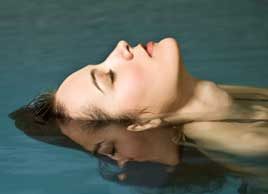Should you try water therapy?
Could curing common ailments be as simple as turning on the tap? Find out if water therapy could work for you

Source: Best Health magazine, December 2012; Image: Thinkstock
I stand in the shower, hot water pouring over my head, and reluctantly turn the tap to cold. ‘One Mississippi, two Mississippi.” Once I count to 30 (which seems like forever), I crank the water back to hot. Two minutes later, back to cold again. I repeat this cycle once more, finishing with a blast of cold water. No, I am not trying to torture myself. It’s ‘homework’ for a naturopathic medicine course I recently took out of personal interest. My instructor said the procedure would improve circulation and general vitality. And the thing is, I did feel invigorated and alert when I got out of the shower; my body felt lighter, and my skin was more taut.
It has long been known that water has medicinal powers: Hippocrates documented its healing powers in the 5th century BC, and in the 19th century it was common for doctors to send ailing patients to spas for ‘the water cure.’ Today, the use of water therapies to treat chronic diseases and pain is commonplace in many European countries, and aquatic physical therapy’the practice of specified movements under the direction of a therapist’is widely used in South Africa, Australia, the U.K., Spain and Israel, says Mark Mandelstam, an Israel-trained physiotherapist at the Kitsilano Physiotherapy Clinic in Vancouver, who is certified in hydrotherapy and aquatic rehabilitation.
In North America, the use of hydrotherapy for health issues is growing, and it is now backed by science. Dr. Bruce E. Becker, director of the National Aquatics and Sports Medicine Institute at Washington State University, has been studying hydrotherapy for more than 30 years. In a 2009 clinical review, which cited more than 190 studies, he wrote in the journal American Academy of Physical Medicine and Rehabilitation that water ‘has broad rehabilitative potential, extending from the treatment of acute injuries through health maintenance in the face of chronic diseases, yet it remains an underused modality.’
Temperature plays a major role in water’s therapeutic abilities: Heat dilates blood vessels, allowing for the delivery of nutrient-rich, oxygenated blood. Cold constricts blood vessels and stops inflammation. And since water conducts heat 25 times faster than air, it delivers these benefits more quickly and efficiently.
Water’s other characteristics’such as buoyancy, resistance and pressure’offer advantages for treating injuries and conditions affecting muscles, bones and joints, says Johnathan Werynski, a registered massage therapist and the clinic and outreach coordinator at the Toronto campus of the Canadian College of Massage and Hydrotherapy. For example, he says, swimming is recommended for people with arthritis because the buoyancy takes pressure off sore joints.
However, water therapy isn’t for everyone, says Werynski. Those with hypertension, kidney disease, renal failure, liver disease or open sores should speak to their healthcare provider before trying hydrotherapy, because the changes in temperature and pressure may exacerbate their condition.
This article was originally titled "Go with the flow" in the December 2012 issue of Best Health. Subscribe today to get the full Best Health experience’and never miss an issue!




